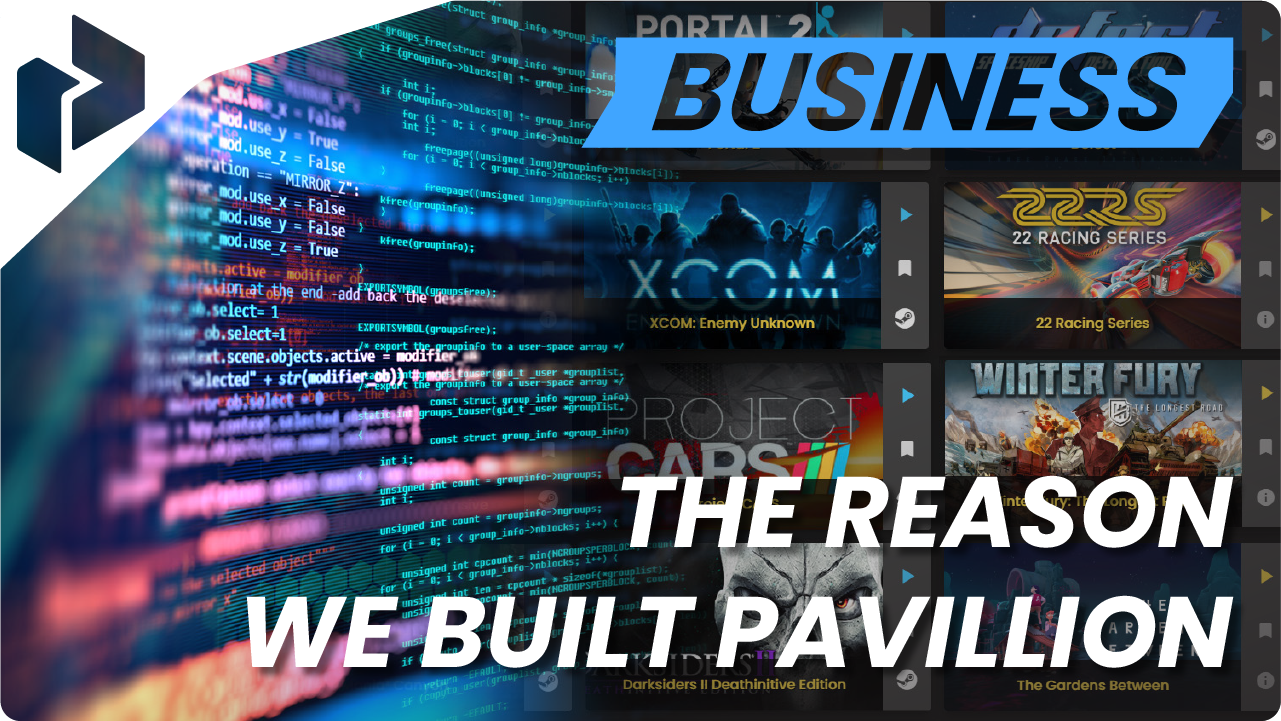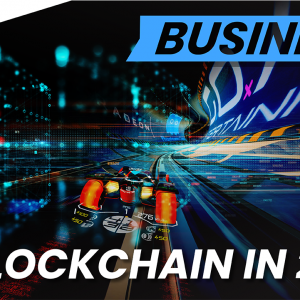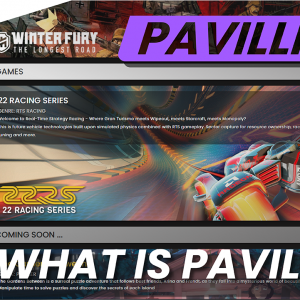GOATi Entertainment never intended to make a game platform. We developed the features we wanted for our esport racing game, 22 Racing Series, but no platform could do what we needed – so we built our own. We started with a basic enterprise licensing and patching solution we’d created for our driver training and traffic sim customers, put a wallet into it, and then one thing kept leading to another …
Key Points
- Pavillion is a blockchain gaming platform that gives players complete control over their games and in-game items.
- It started as a quick mod of a basic license-checking platform we’d already built, with a blockchain wallet thrown into it.
- Based on community requests and the team’s vision, Pavillion kept growing one feature at a time.
Pavillion in a Nutshell
Pavillion is a blockchain gaming platform that allows users to buy and play games, no different to other gaming platforms like Steam, but with the added benefit that players have ownership and control over their games and in-game items, as well as allowing for a more streamlined and inclusive marketplace for content creators and esports tournaments.
We’ve designed it so that as a new user, you don’t need to know anything about blockchain to use it. It’s just like a regular digital platform UX (with a few additional account creation options) where new users can create an account with a user/pwd combination and then buy games and in-game items using a credit card.
*Currently users need to purchase a pack of our in-platform stable tokens first, but we’ll soon be adding more features to streamline this even further.
For a more detailed look at Pavillion, check out this post.
The Reason for Pavillion
We built 22RS to be an esport focused racing game that would benefit the players. We wanted a more integrated eco-system, with cross-border prize pay-outs for tournaments, in-game branding for esports teams and leagues, the ability for players to sell in-game items, etc. Integrating blockchain into our game and backend was the first step to making this possible, but we still needed a way to get it into player’s hands.
22RS is already on Steam, but that’s a closed platform, and we needed a way to distribute our blockchain integration of the game with the NFT game licenses and in-game assets for players to be able to make full use of their NFTs and trade them safely and easily. We wanted an easy to use Steam-like service where the NFT version of the game could be downloaded and patched for you, but there simply wasn’t anything out there that could do what we needed.
We already had a bare bones version of something like this, which we built for enterprise for our driver training program MyDriveSchool and for our AI traffic simulation technology. So, the most practical thing to do was to take this, include a blockchain wallet and add a nicer front end.
Our initial intention was to spend a month getting the platform up and running, and then we’d get right back onto development of 22RS. But our userbase increased quickly – within a few months, we had over 5,000 accounts – it had a great momentum, we were enjoying making it, and so we didn’t stop. Once our growing community started sharing their suggestions to make the platform even better, we wanted to deliver. We were always focused on just one more feature, so the development process never felt overwhelming.
We enjoyed developing Pavillion in a way that we never expected, as it was just meant to be a means to an end, and not a whole new project. It’s been satisfying building the platform that we as gamers always wanted, with digital freedoms that we never had. Not to mention, a platform that can deliver more equitable returns for developers like ourselves – but we’ll talk about this in a separate article.
The Perks of Blockchain Games

As mentioned earlier, traditional gaming platforms don’t allow you to resell the games or apps you buy. And if you discover or win any in-game assets, you don’t have any ownership or control over those either. Your purchase represents something more like a subscription, with a promise from the platform that you will have use of the digital assets you bought, rather than full ownership of them.
The only way around this on existing platforms is to sell your entire account, but that’s against most subscriber and end-user license agreements. It’s also awkward and far from ideal, as your other accounts (emails, cloud storage, etc.) might be tied to this account. Plus, you’d likely only want to offload a few games or items that you don’t use anymore, not sell absolutely everything you’ve ever bought.
As a Pavillion user, you have natural ownership and control over all of your digital assets and tokens. Since Pavillion uses blockchain, it’s decentralised, which means that your assets and tokens are not tied to us. Users are fully able to trade any of their items on any third-party platforms or trade with each other directly.
This brings ownership of digital items in line with what we’ve come to expect with any physical asset we own in the real world: If you own a boxed game, a car or a tennis racquet, you’re able to use it, lend it, trade it in, sell it privately and so on.
At the same time, you get the benefits of owning digital items – games don’t take up space in your home, and they don’t get scratched and become unusable.
Best of all, if you lend a blockchain game to a friend, you don’t have to pester them to give it back (we’ve all been there, right?) – a smart contract can auto-return it to you!
Keep an eye out for future articles that will go into more detail about further platform benefits and upcoming features for content creators and esports tournaments.
PLAY 22RS NOW




